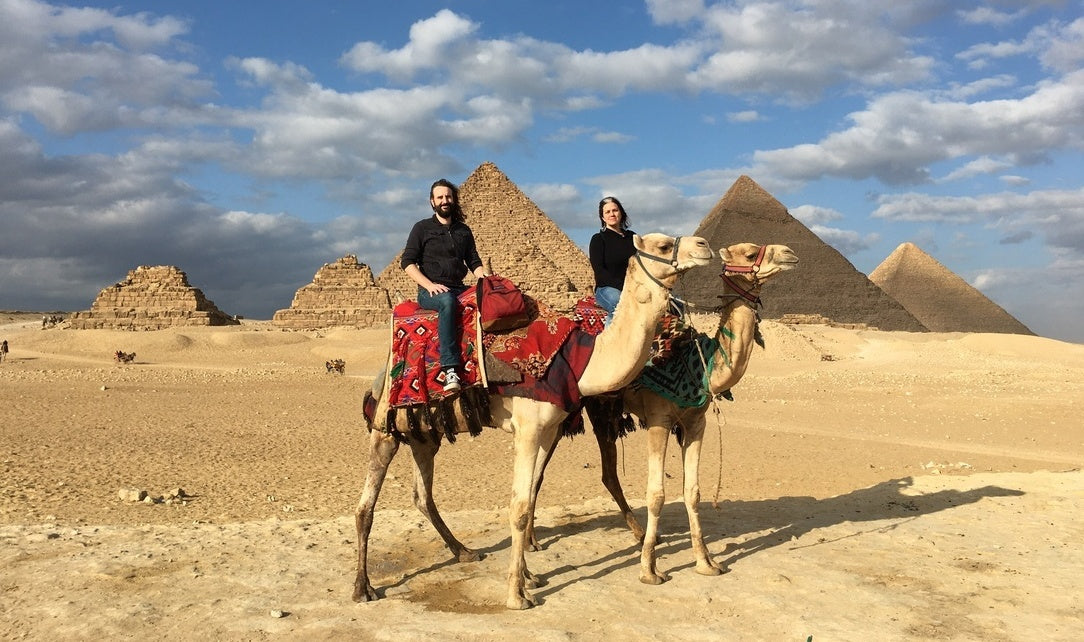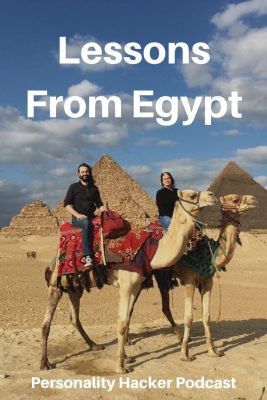Download Episode Here – right click link and select “Save Link As…”
In this episode, Joel and Antonia talk about their recent trip to Egypt and the lessons taken from an ancient civilization.
In this podcast you’ll find:
- How did Joel and Antonia end up visiting Egypt? The backstory behind their whirlwind trip.
- What’s it like visiting Cairo as westerners? Some cultural differences.
- Sacred spaces – the energetic feel of the pyramids and other ancient structures.
- A bit of political background on Egypt.
- The Karnak temple – what are the lessons and wisdom we can gain from a structure that took 1300 years to build?
-
The importance of history – analyzing this through the Data Knowledge Information Wisdom (DIKW) model
- How does our relationship to history impact young people today?
- The role of technology
- A glimpse of ancient knowledge and wisdom
- What can be gained from visiting a place versus experiencing it through technology and research alone?
-
What was it like to meditate in the White Desert?
- Antonia’s perspective shift and takeaways
- Contrasting Cairo with the Sahara desert
-
Many of us have conceit about it being easy to save the world – how international travel can help us form a more realistic view of the bigger picture.
- The role of individual and collective efforts in effecting world change
- How tipping points work in pushing humanity forward
-
The messages surrounding leadership Joel gained from the trip.
- The unique circumstances of Egypt has and how this relates to leadership
- How do Joel and Antonia’s takeaways from the trip align?
- Egypt’s response to external change agents throughout the years.
- The rising popularity of personal growth and personality models in Cairo.
- How the perspective Antonia gained casts a different light on the drama we see online and in the media.
- History is owned by the people of today but they can destroy it too – the impressions of permanence and impermanence Joel and Antonia gained from their trip.
To subscribe to the podcast, please use the links below:
Subscribe with iTunes
Non-iTunes Link
Soundcloud
Stitcher
Google Play
Spotify
Radio Public
PlayerFM
Listen Notes
If you like the podcast and want to help us out in return, please leave an honest rating and review on iTunes by clicking here. It will help the show and its ranking in iTunes immensely! We would be eternally grateful!
Want to learn more?
Discover Your Personal Genius
We want to hear from you. Leave your comments below…



Share:
Podcast - Episode 0316 - The Righteous Mind and Our Moral Taste Buds
Podcast - Episode 0318 - Pain and Self Deceit At Each Maslow Level
10 comments
Antonia’s “nihilistic” take-aways really resonated with me, a fellow NT. I feel like I often have thoughts that are similar to hers, but there’s always a part of me that asks “does thinking this make me an asshole?” Which is interesting because I never feel that way when Antonia talks about some cold-hard truths. So either no, I’m not an asshole, or yes I am and Antonia just has such a refined way of articulating her thoughts.
Here’s some half-baked further thoughts:
Lately, a lot of my settling into myself has been rooted in the idea of being insignificant. More than anything, it’s liberating. Since I have stopped letting myself feel guilty for not doing more things to “reach my potential,” I have allowed myself simply to be. It’s shifted my whole life to be more mindful, instead of using mindfulness as an activity when I choose to. And since freeing myself of the burden of potential, I’ve felt more at peace with myself than ever. It’s liberating and inspiring to release ourselves from the clutch of who we could be. As cliché as it sounds, embracing the life I am actually living instead of being attached to some idea of parallel universe mes has been incredibly grounding.
I think there’s something with delayed gratification that has led me to value my future self over my present self. But true mindfulness and radical self-acceptance isn’t that. It’s having gratitude and attentiveness for who I am now, and allowing myself to really lean into that.
Anyway, thank you Antonia and Joel for sharing this part of your journey with us! Your insight is profoundly valuable to me.
Dropping a literal Death Note on the world because you’re bored and want to see what happens is definitely an Ne thing to do. 100%. Ne of dubious ethics, but Ne nonetheless. Then again, human ethics don’t really apply here.
This is well traveled territory for me. In fact, we did an entire podcast on the subject where I detail all the psychedelics I’ve taken. :P
I agree that they can be powerful tools to the collective unconscious, but they’re also a bit unpredictable and require more from the traveler than simply taking them. That makes them less of an “on-ramp” and more of a “parachuting-in” situation. I’m definitely keeping them in mind while asking this question.
A
Thank you for your hopeful and relatable perspective, Joel. Really appreciate you.
The sperm detail is fascinating to me as well. Egyptians highly valued dreams, I wouldn’t be the least bit surprised if it was from a dream that they gleaned this information. Even in our modern culture that doesn’t give much credence to the idea that dreaming is a form of perceiving “real” information, quite a few world-changing theories and break-throughs have still been first born into consciousness via dreams. I would assume that living in a culture where dreams were widely valued and deemed inherently informative would lead to even more amazing discoveries.